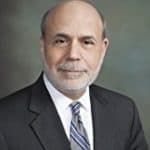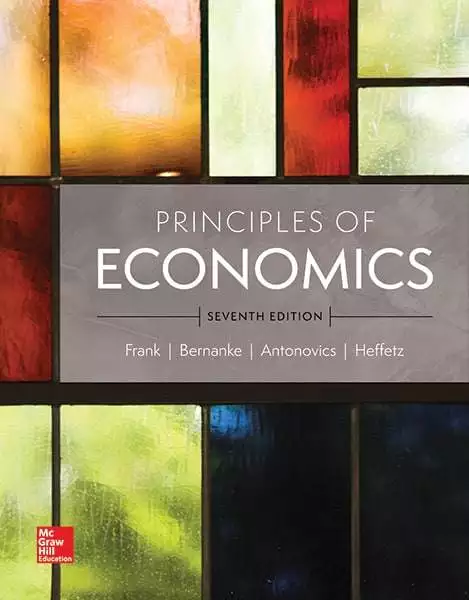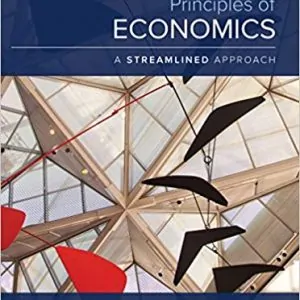Principles of Economics, 7th Edition, (PDF) gives a deeper understanding of economics by eradicating overwhelming element and emphasizing seven core ideas which can be bolstered and illustrated all through the ebook. With fascinating questions, explanations and workout routines, the authors help economics college students to narrate financial ideas to a quantity of on a regular basis experiences like going to the ATM or buying airline tickets. Throughout this course of, the authors inspire college students to turn out to be “financial naturalists:” individuals who use fundamental financial ideas to grasp and describe what they observe on the earth round them. With new movies and interactive graphs along with SmartBook’s adaptive studying expertise, the most recent Frank/Bernanke/Antonovics/Heffetz’s 7th version allows academics to spend class time facilitating, participating, and answering questions as a substitute of lecturing on the fundamentals. P.S. Contact us if you would like Principles of Economics, 7th Edition, Test Bank, or different teacher sources. NOTE: The product only consists of the ebook, Principles of Economics, 7th Edition in PDF. No access codes are included.
Principles of Economics (7th Edition) – Frank/Bernanke – PDF
eBook details
- Authors: Robert H. Frank, Ben S. Bernanke, Kate Antonovics, Ori Heffetz
- File Size: 19 MB
- Format: PDF
- Length: 878 Pages
- Publisher: McGraw-Hill Education; 7th edition
- Publication Date: May 1, 2018
- Language: English
- ISBN-10: 1260110915, 1259852067, 1260092917, 1260270696, 1260110974
- ISBN-13: 9781260110913, 9781259852060, 9781260092912, 9781260270693, 9781260110975
$85.99 Original price was: $85.99.$19.00Current price is: $19.00.
About The Author

Ben Bernanke
Dr. Ben S. Bernanke is a Distinguished Fellow in Residence with the Economic Studies Program at the Brookings Institution. From February 2006 through January 2014, he was Chairman of the Board of Governors of the Federal Reserve System. Dr. Bernanke also served as Chairman of the Federal Open Market Committee, the System's principal monetary policymaking body.
Before his appointment as Chairman, Dr. Bernanke was Chairman of the President's Council of Economic Advisers, from June 2005 to January 2006. He had already served the Federal Reserve System in several roles. He was a member of the Board of Governors of the Federal Reserve System from 2002 to 2005; a visiting scholar at the Federal Reserve Banks of Philadelphia (1987-89), Boston (1989-90), and New York (1990-91, 1994-96); and a member of the Academic Advisory Panel at the Federal Reserve Bank of New York (1990-2002).
From 1994 to 1996, Dr. Bernanke was the Class of 1926 Professor of Economics and Public Affairs at Princeton University. He was the Howard Harrison and Gabrielle Snyder Beck Professor of Economics and Public Affairs and Chair of the Economics Department at the university from 1996 to 2002. Dr. Bernanke had been a Professor of Economics and Public Affairs at Princeton since 1985.
Before arriving at Princeton, Dr. Bernanke was an Associate Professor of Economics (1983-85) and an Assistant Professor of Economics (1979-83) at the Graduate School of Business at Stanford University. His teaching career also included serving as a Visiting Professor of Economics at New York University (1993) and at the Massachusetts Institute of Technology (1989-90).
Dr. Ben Bernanke has published many articles on a wide variety of economic issues, including monetary policy and macroeconomics, and is the author of several scholarly books and two etextbooks. Ben has held a Guggenheim Fellowship and a Sloan Fellowship, and is a Fellow of the Econometric Society and of the American Academy of Arts and Sciences. Ben served as the Director of the Monetary Economics Program of the National Bureau of Economic Research (NBER) and as a member of the NBER's Business Cycle Dating Committee. In July 2001, he was appointed Editor of the American Economic Review. Ben's work with civic and professional groups includes having served two terms as a member of the Montgomery Township (N.J.) Board of Education.
He was born in December 1953 in Augusta, Georgia, and grew up in Dillon, South Carolina. He received a B.A. in economics in 1975 from Harvard University (summa cum laude) and a Ph.D. in economics in 1979 from the Massachusetts Institute of Technology. Dr. Ben is married and has 2 children.

Kate Antonovics
Dr. Kate Antonovics got her B.A. from Brown University in 1993 and her Ph.D. in economics from the University of Wisconsin in 2000. Shortly thereafter, she joined the faculty in the Economics Department at the University of California, San Diego, where she has been ever since. Kate is known for her innovative use of technology in the classroom and for her superb teaching. Her highly popular introductory-level microeconomics course regularly enrolls over 450 students each fall.
Professor Antonovics also teaches labor economics at both the graduate and undergraduate levels. In 2012, she received the UCSD Department of Economics award for best undergraduate teaching. Her research has focused on gender discrimination, intergenerational income mobility, affirmative action, racial discrimination, learning, and wage dynamics. Dr. Antonovics' papers have appeared in the Review of Economics and Statistics, the Journal of Labor Economics, the American Economic Review, and the Journal of Human Resources. She is a member of both the American Economic Association and the Society of Labor Economists.

Ori Heffetz
Dr. Ori Heffetz received his B.A. in physics and philosophy from Tel Aviv University in 1999 and his Ph.D. in economics from Princeton University in 2005. He is an Associate Professor of Economics at the Samuel Curtis Johnson Graduate School of Management at Cornell University, where he has taught since 2005. Bringing the real world into the classroom, Ori has created a unique macroeconomics course that introduces basic concepts and tools from economic theory and applies them to current news and global events. His popular classes are taken by hundreds of students every year, on the Cornell Ithaca campus and, via live videoconferencing, in dozens of cities across the U.S., Canada, and beyond. Dr. Ori’s research studies the social and cultural aspects of economic behavior, focusing on the mechanisms that drive consumers’ choices and on the links between economic choices, individual well-being, and policymaking. Dr. Heffetz has published scholarly work on household consumption patterns, individual economic decision making, and survey methodology and measurement. Ori was also a visiting researcher at the Bank of Israel during 2011, is currently a Faculty Research Fellow at the National Bureau of Economic Research (NBER), and serves on the editorial board of Social Choice and Welfare.

Robert H. Frank
Dr. Robert H. Frank received his M.A. in statistics from the University of California at Berkeley in 1971, and his Ph.D. in economics in 1972, also from U.C. Berkeley. Robert is the Goldwin Smith Professor of Economics at Cornell University, where he has taught since 1972 and where he currently holds a joint appointment in the department of economics and the Johnson Graduate School of Management. Dr. Frank has published on a variety of subjects, including public utility pricing, the measurement of unemployment spell lengths, price and wage discrimination, and the distributional consequences of direct foreign investment. For the past several years, Robert's research has focused on rivalry and cooperation in economic and social behaviour.
You must be logged in to post a review.








Reviews
There are no reviews yet.